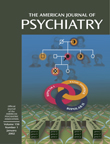MECP2 Mutation in a Boy With Language Disorder and Schizophrenia
At birth Arnold weighed 3.75 kg and was 52 cm in length. The results of a pediatric examination were normal, except for a bilateral pseudomembranous syndactyly of toes two, three, and four. His psychomotor development was normal until he was 2 years of age, at which time he became irritable. At 3 years of age, he exhibited the features of developmental receptive language disorder. The initial treatment program included speech therapy, group therapy to help Arnold deal with his peers, and psychotherapy. At age 6, Arnold entered a day care program for children with developmental language disorder that included special education. Three years later, he showed dramatic improvement, although he still exhibited impaired language development.At 12 years Arnold suddenly exhibited severe psychosis, and hospitalization was required. The results of an initial examination showed a pubertal boy with auditory and visual hallucinations, insomnia, anxiety, agitation, stereotypies, and delusional ideas of persecution. An EEG, a computerized tomography head scan, and the results of routine blood tests were normal. Arnold was sequentially treated with cyamemazine, pimozide, thioridazine, amisulpride, and risperidone. All drug treatments were discontinued because of adverse effects, including extrapyramidal symptoms, a cutaneous rash, a bowel obstruction, and urinary retention. His psychiatric symptoms did not seem to be influenced by neuroleptic treatment, although it caused some fluctuation in severity. After 2 months Arnold was given lithium, but it was discontinued a few days later because of vomiting. All medications were discontinued, and Arnold was transferred to a pediatric hospital unit for laboratory investigations because of his family history, a second EEG showing slow waves, and symptom fluctuation. The results of all tests, including lumbar biology, serology, cytogenetics, and a test for metabolic diseases, were normal.Five months later, Arnold’s psychotic symptoms improved. However, he was slightly hypotonic and apathetic and had lost all cognitive skills, including language. He recovered slowly during the next 6 months. One year later, he exhibited a second episode of psychosis. Low doses of chlorpromazine, 100 mg/day, improved his symptom profile. His diagnosis of childhood-onset schizophrenia, based on DSM-IV criteria, was retained. Not long ago, an alanine-140-valine mutation of the MECP2 gene was found to exist in Arnold and his unaffected mother. Such a missense mutation (resulting in amino acid substitution), located in the methyl-CpG-binding domain of the protein, has been located in another family and was found to be associated with mild mental retardation in females and severe mental retardation in males (4).
References
Information & Authors
Information
Published In
History
Authors
Metrics & Citations
Metrics
Citations
Export Citations
If you have the appropriate software installed, you can download article citation data to the citation manager of your choice. Simply select your manager software from the list below and click Download.
For more information or tips please see 'Downloading to a citation manager' in the Help menu.
View Options
View options
PDF/EPUB
View PDF/EPUBGet Access
Login options
Already a subscriber? Access your subscription through your login credentials or your institution for full access to this article.
Personal login Institutional Login Open Athens loginNot a subscriber?
PsychiatryOnline subscription options offer access to the DSM-5-TR® library, books, journals, CME, and patient resources. This all-in-one virtual library provides psychiatrists and mental health professionals with key resources for diagnosis, treatment, research, and professional development.
Need more help? PsychiatryOnline Customer Service may be reached by emailing [email protected] or by calling 800-368-5777 (in the U.S.) or 703-907-7322 (outside the U.S.).

